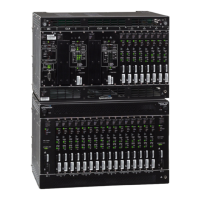1
TimeHub 5500 TL1 Reference Manual
231
Troubleshooting
097-55501-02 Issue 5: June 2003
2
5
3
SSSSSSSSSSSS SSSS S SSSSS SSSSSSS S SSS S SSSSS
5
(whichever is less), and is retrieved in chronological order. No battery backup is
provided.
Automatic messages may be retrieved from the AO log using the Retrieve
Automatic Messages (RTRV-AO) command.
Event Types
There are two types of events:
• State events: an ongoing condition
• Transient events: a transient occurrence, not an ongoing condition
State Events
State events have an active (set) and cleared state. Depending on the configuration
of the severity (ALM) property of the event, alarms can be generated or cleared, and
TL1 reports can be issued whenever these events change their state.
Values for the state event ALM property are as follows:
• NONE: Alarms or reports are not generated by either setting or clearing this
event.
Note:
The RTRV-COND-TSG command can be used to retrieve all active state
events, including those with the ALM property set to NONE.
• NONALM: Both setting and clearing this event generates a RPT EVT TSG
message indicating the change in state. No alarms are generated.
• MINOR: Setting this event generates a minor alarm indication and a RPT
ALM TSG message. Clearing this event clears the associated alarm
indication and generates another RPT ALM TSG message indicating the
clearing of the alarm.
• MAJOR: Setting this event generates a major alarm indication and a RPT
ALM TSG message. Clearing this event clears the associated alarm
indication and generates another RPT ALM TSG message indicating the
clearing of the alarm.
• FAIL: This setting is similar to MAJOR, except that if no standby unit is
available to take over operation for the failed unit (or the standby unit also
has a fail condition), the alarm level is escalated to critical. If a major alarm
is indicated and the standby unit later becomes unavailable (is removed or
a fail condition occurs), this alarm will be escalated to critical, with a new
message generated.
Events related to input signals are normally only reported by the active clock card
to avoid duplicate reports from the two clock cards (refer to the Report All keyword
in the Keywords chapter).

